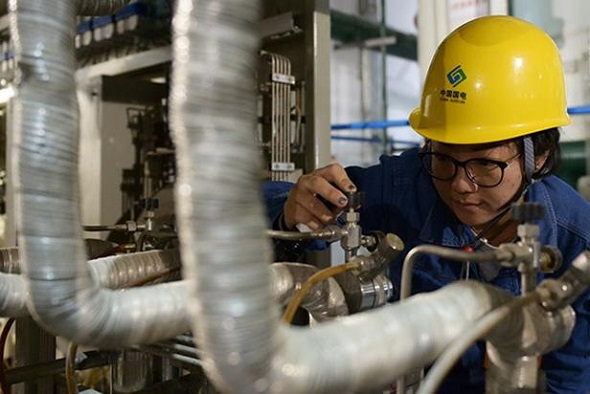 A technician of China Guodian Corp checks facilities in Lanzhou, capital of Gansu province. (Photo/Xinhua) Reform committee calls for combining internal governance, control of risks State-owned enterprises that are heavily indebted should bring their debt levels down to "reasonable levels as soon as possible", urged a high-profile central meeting on Friday that was presided over by President Xi Jinping, also general secretary of the Communist Party of China Central Committee. The Central Committee for Deepening Overall Reform, holding its second meeting this year, reviewed and adopted rules and regulations covering areas such as reform of local public institutions, debt control of State-owned enterprises, regulation of State assets of Party and State agencies and public institutions, reform of enterprises affiliated with higher-learning institutions and the pension system, and implementation of major reform measures set at the Communist Party of China's 19th National Congress in October. Participants agreed that strengthening control of the debt levels of State-owned enterprises is an important move to implement the spirit of the 19th National Congress and promote the deleveraging and prevention of debt risks of such enterprises. Internal corporate governance and external control of risks should be combined, and a mechanism for controlling the asset-liability ratio of State-owned enterprises should be established and improved, they said. Supervision should be strengthened to push debt levels of heavily indebted SOEs back to reasonable levels as soon as possible, the meeting decided. Central SOEs' debt levels have steadily dropped in recent years. Their total assets reached 54.5 trillion yuan ($8.6 trillion) in 2017. Their average asset-liability ratio was 66.3 percent in 2017, down by 0.4 percentage point from the 2016 level. Regulators said they will impose targeted regulation on different types of SOEs this year, depending on their debt levels. Analysts said China will gradually put its corporate debt risks under control. "China is heavily engaged in handling financial deleveraging reform, which includes the reducing of corporate debt, especially for the State-owned ones with overcapacity," said Iris Pang, an economist with banking group ING. "But the policymakers would need to skillfully manage liquidity so that the case does not fuel a series of defaults, which would make the market nervous. We expect the Chinese government will be able to manage the rising credit risks in China," Pang added. Xi said at the meeting that China has made major headway in its reform of central institutions.
|
Powered by Discuz! X3.4
© 2001-2013 Comsenz Inc.